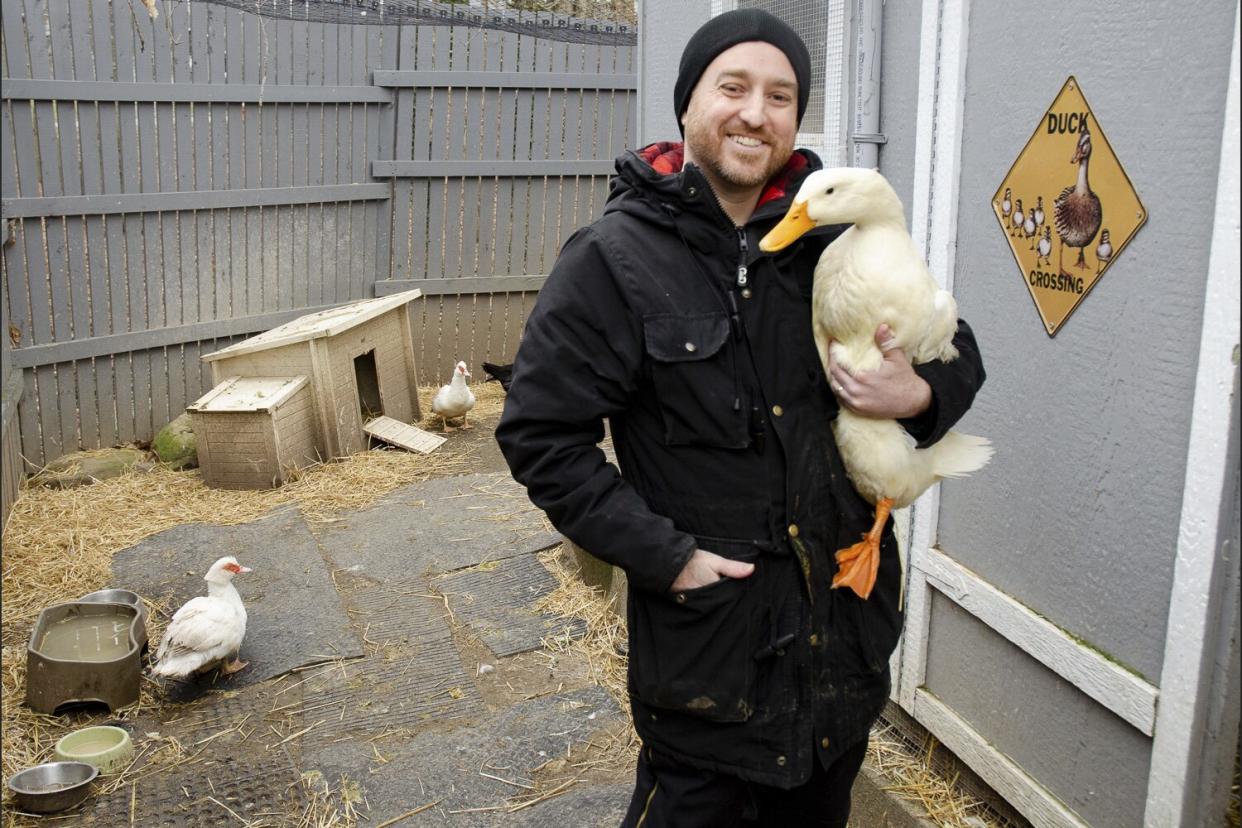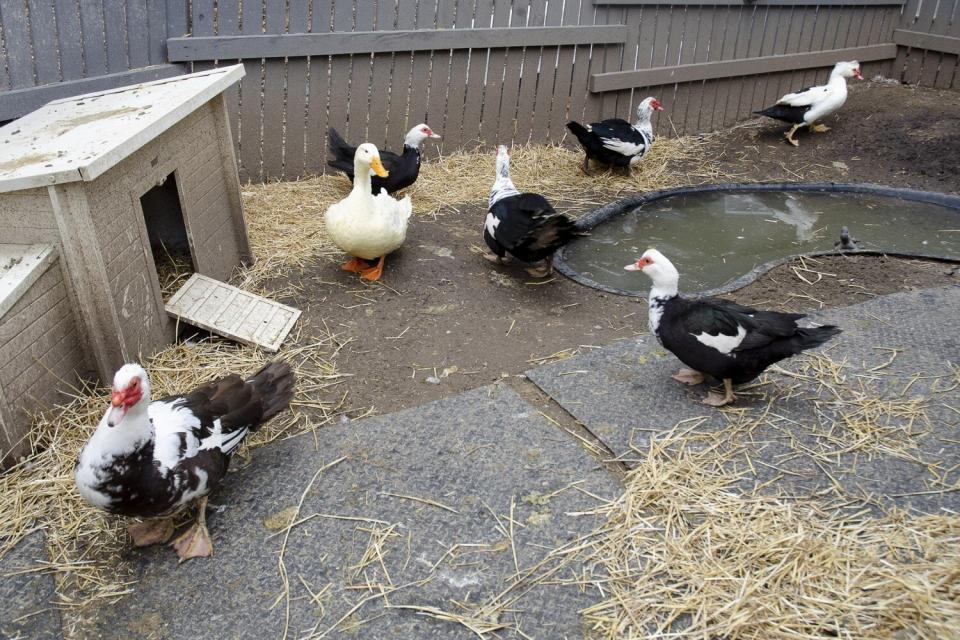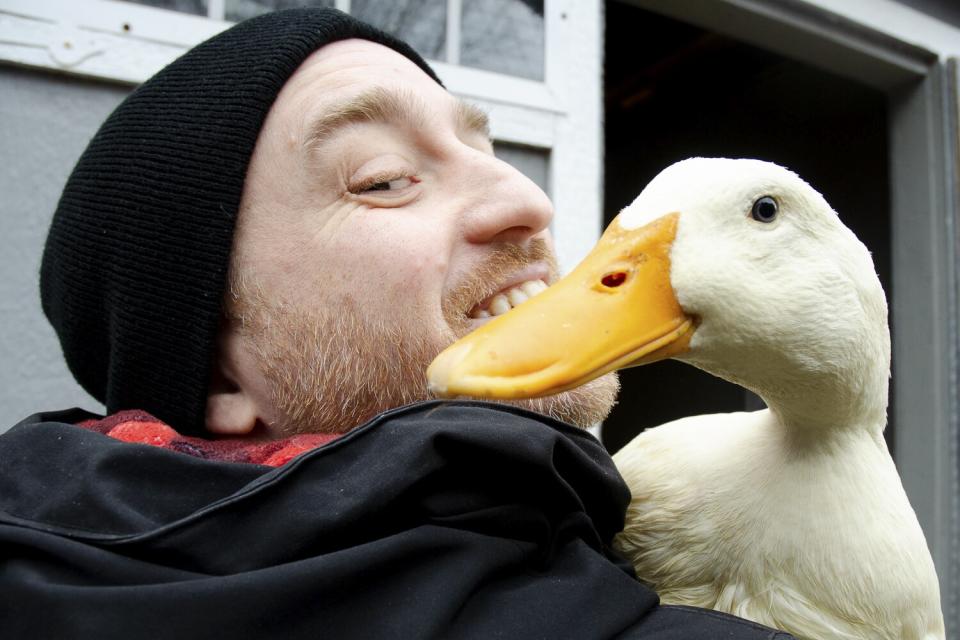Rescue Caring for Hundreds of Dumped Birds Warns Don't 'Impulse Buy' Chicks to Be 'Easter Photo Props'

David Paone
With Easter approaching, many well-intentioned people may be planning to purchase baby chicks or ducks to use in holiday-themed photographs or as a festive surprise gift for young children — but how do these decisions affect the animals?
"We need to end this practice," John Di Leonardo, a scientist and animal rights advocate, tells PEOPLE.
"Every spring, we get calls from people who bought little ducklings or little chicks because they thought it would be cute for Easter. They stick them in an Easter basket, they take some photos, and they very quickly realize that it was just an impulse buy," he adds.
"They thought it was cute, but now that duckling is a pooping machine. He's growing twice the size every couple of days until you get these big monsters that we have in our aviary right now."
Since 2012, Di Leonardo and his wife have run Humane Long Island, a nonprofit animal rescue group. Along with a few volunteers, the couple rescues and fosters abandoned chicks and ducks, helping around 600 animals each year.
"The busy season is usually around Easter," Di Leonardo says. "March is when it kind of starts. April is terrible. We're rescuing ducks constantly."
RELATED: Thailand Sanctuary Caring for Elephants with 'Caved-in' Backs Damaged by Years of Tourist Rides
Often these no-longer-wanted Easter birds aren't delivered directly to Humane Long Island but dumped in a local pond or the wild, which is illegal in New York.
Di Leonardo has found there are repeat offenders. "They'll get them for Easter, they'll dump them on someone else, and next Easter, they'll get more of them," he shares, adding that chicks and ducks are often purchased at farm supply stores as impulse buys.

David Paone
"They may sell hay, they may sell hardware," Di Leonardo says, but come the spring, they sell chicks and ducklings, which people will buy without thinking the responsibility through.
These birds almost always have medical problems simply because they're in the wrong environment.
For starters, birds are "flock animals" and need to live in large groups. There's a law in New York requiring chicks and ducklings to be sold in quantities of at least six, but "it's violated all the time," according to Di Leonardo.
So if a single chick or duckling is brought home, it's doomed from the start.
"They're precocial birds, which means they imprint on their mother," says Di Leonardo.
RELATED: Indian Villager Lives with Crane He Rescued from Death: 'I Can't Imagine Life Without Him'
They'll imprint on each other if there's no mother but at least several other birds.
"So when absent a mother [or other birds], they're going to imprint on humans. That creates a permanent welfare issue because at that point, that bird won't even know they're a duck anymore, won't even know they're a chick," says Di Leonardo, a trained anthrozoologist.
"They're confused about their whole state of being because they think the human is the mother; therefore, they think they are human."
This leads to problems for the hastily bought birds and the people, like Di Leonardo, who end up caring for the animals.
The birds are often fed the wrong diet by their unprepared seasonal owners, resulting in a niacin deficiency which can lead to deformity in the animals' legs. Ducks and chickens can develop "bumblefoot" from being kept indoors and "splayed legs" from living in a bathtub.

David Paone
These are just a few of the consequences birds bought for Easter can suffer in the wrong environment.
"We're teaching children all the wrong lessons, that these [animals] are disposable props," Di Leonardo says.
Long Island Humane makes an effort to get all the abandoned Easter birds it saves placed in foster homes until someone can adopt the animals permanently. But that's not always the case.
Never miss a story — sign up for PEOPLE's free daily newsletter to stay up-to-date on the best of what PEOPLE has to offer, from juicy celebrity news to compelling human interest stories.
"Sometimes we get them, and they're already too far gone, and the kindest thing is to let them go," Di Leonardo says. He works with a veterinarian to euthanize the birds humanely in this situation.
With Easter days away, Di Leonardo has a final message for animal lovers: "Ducks and chicks are not school science experiments; they're not Easter photo props."
"They're not trash to be discarded when you don't want them anymore. They live 10 to 20 years. So if you're going to get one of these animals, you should always adopt, not shop, and be sure that you know what you're getting into."

